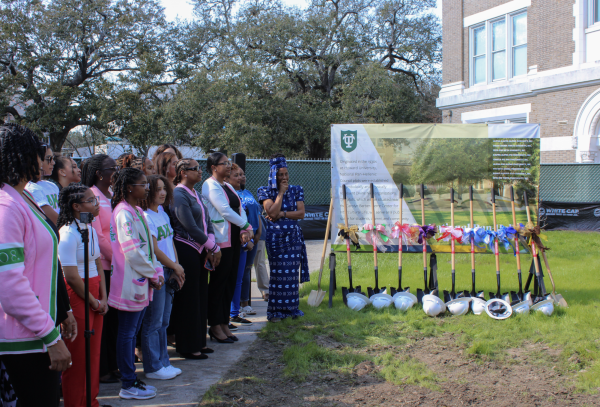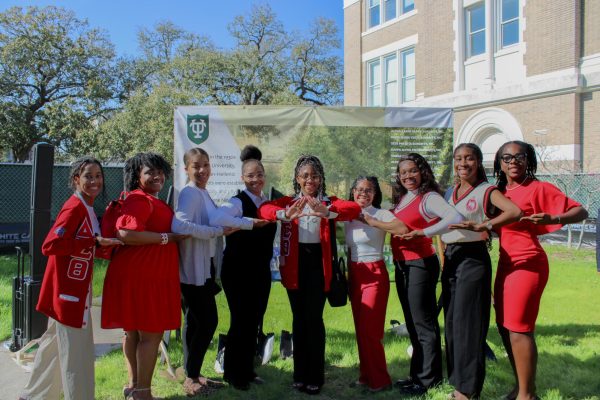There are 3,100 students on the Panhellenic Council and Interfraternity Council at Tulane University.
In the National Pan-Hellenic Council — a historically Black letter organization council — there are 34.
The difference has long been a dilemma. Each year, hundreds of women fly to school early to begin Panhellenic sorority recruitment, and hundreds of men rush IFC fraternities in the fall and pledge in the spring.
But Tulane’s NPHC currently hosts three active chapters with 34 student members across Tulane and Loyola University. NPHC has nine organizations, known as the Divine Nine, and Tulane’s active chapters include the Alpha Kappa Alpha Sorority, Inc., Delta Sigma Theta Sorority, Inc. and Zeta Phi Beta Sorority, Inc.
The AKAs have 18 members.
The Deltas have 15.
The Zetas have one.
“I think that it’s unfortunate that our organizations don’t get as much attention as organizations in Panhel and IFC,” senior and Delta member Anaya Rodgers said. “I understand why it happens at a [predominantly white institution] like this, where there’s so few members, but I think if we were to take a step back and look at the work that is being done by these organizations … there would be a lot for everybody to take from how small we are, but how much we can get done.”
The plots: Marking a new beginning
But the members hope that recognition is coming.
For the past two years, a sign has sat on the academic quad describing the importance of NPHC plots and stating that plots would be completed in the spring of 2023. Plots are structures or physical spaces that represent the “Divine Nine” organizations with each group’s letters, colors or symbols.
At the NPHC plots groundbreaking ceremony on Feb. 23, as they dug into the ground with decorative shovels, students, faculty and alumni gathered on the academic quad to sing, cheer and speak about the significance of the plots.

“This has been a long time coming,” Carolyn Barber-Pierre, assistant vice president of intercultural life, said. “I am so delighted to be here today to welcome you to this event because this is history … We want more support.”
The process of getting the plots approved was delayed because the plots required approval from each of the nine organizations.
“I am absolutely thrilled this project is happening,” Laura Osteen, assistant vice president of student affairs, said. “I think it is critical to physically demonstrate the university’s support and celebration of NPHC chapters on our campus.”
Other universities like Wake Forest University, Davidson College, Duke University and Northwestern University have NPHC plots. According to Tulane, the plots will serve as a “public place for students, alumni and community members to gather, reflect and celebrate the history and continued work or organizations within NPHC.”
“I’m here today for one of the biggest moments in Tulane history; a moment that generations of Black students wish they could’ve been a part of,” Raven Ancar, class of 2022 alum and Delta member, said at the ceremony.
Ancar suggested the idea of the plots when she was president of Tulane’s Black Student Union in 2020. During the pandemic, the club met over Zoom to create a proposal for the plots.
“In 2020, so many people said BSU writing these announcements was a waste of time and a waste of effort, and yet we are here today,” Ancar said. “These plots are more than just a physical representation of the beloved organizations … We are grateful for our university, but let the record show that these plots were demanded by students. It wasn’t given to us.”
AKA member and junior Aryanna Baytop said she has concerns about “people not giving the proper respect to the area.”
“[The plots] are very significant and they’re supposed to be highly respected,” Baytop said. She said that the plots should not be a general social space for everyone. “It’s a very, very sacred area; even I, as an AKA, I’m not going to any other organizations’ plots.”
“These plots are our shared legacy,” Ancar said.
NPHC’s history at Tulane
NPHC was founded in 1930 at Howard University in Washington, D.C. NPHC came to Tulane when the Nu Mu chapter of Delta Sigma Theta was founded in 1977.

The Nu Mu chapter is citywide, with members from Tulane and Loyola. Currently, the chapter has nine Loyola students and six Tulane students.
“It can be really challenging at times, feeling like we are being represented when the chapters are small, and we have so few chapters of the [Divine] Nine,” Rodgers said. “We show up within the small Black community of Tulane, but I feel like we don’t have the platform a lot of the time to make ourselves known on the campus level.”
Nelda Bailey, director of fraternity and sorority programs, came to Tulane in fall of 2022. Bailey also serves as the advisor for NPHC.
“I would like to see Black Greek life continue to meet the needs of our Black students while allowing space for growth and innovation,” Bailey said. “My current hope is to reactivate some of our dormant chapters to allow even more space for Black Tulane to find a home in NPHC. NPHC organizations and members have a long history of positively driving the Black narrative in America, and I would love to see that continue.”
There are currently three inactive chapters at Tulane: Kappa Alpha Psi Fraternity, Inc., Phi Beta Sigma Fraternity, Inc. and Alpha Phi Alpha Fraternity, Inc..
The Rho Iota chapter of the Alpha Phi Alpha, was founded at Tulane in 1989. Alpha Phi Alpha, known as the “Alphas,” was the first intercollegiate Greek-letter fraternity established for Black men in 1906 at Cornell University.
The Rho Iota chapter at Tulane was placed on suspension on June 7, 2023.
Tulane law student and Alpha member Bruce Carter went through the intake process and was initiated in the spring of 2021.
“It was a great experience,” Carter said. “It brought me closer to a lot of older Black males, which was very important to me because I never really had a father figure in my life, so it was good to meet people that not only were people that were my age, but people that were older than me and had different experiences that I could learn from.”
There is no annual timeline for NPHC recruitment, or what AKA calls “membership experience.” Each chapter gets to decide on a semester basis when they take in a new line, or group of new members.
“It’s [the] beauty of it; it’s kind of bittersweet because on one hand, no, we don’t have a timeline, and we can do it whenever we feel like it,”AKA senior Jordan Brignac said. “It just depends. But there’s also the bad side, so you never know when a new membership experience is going to happen.”
Loyola sophomore Nilya McKenzie is the only current member of the Iota Omicron Metropolitan chapter of Zeta Phi Beta. The Metropolitan chapter means that it is present on both Tulane and Loyola’s campuses.

“Being the only person in the chapter, it never feels like that because I always have support from both sides, both Loyola and Tulane,” McKenzie said. “I have two full-time jobs, I’m in various other organizations, so it is a lot of pressure. But I can also say that my NPHC is completely understanding … both campuses are very accommodating and made me feel at home and as comfortable as possible.”
Though McKenzie holds much responsibility as the only member of a national organization with over 125,000 initiated members nationwide, she sees a bright future with NPHC at Tulane and Loyola.
“[The plots] are a great opportunity to bring in more members overall for the NPHC, but also give us students a safe place,” McKenzie said. “That’s the main thing when it comes to being a colored student on PWI’s campus … it just feels like it’s a huge step forward. It’s something that you don’t typically hear happen at universities like Loyola and Tulane. It’s just one more step of making our community feel more safe, appreciated and valued.”




Leave a Comment